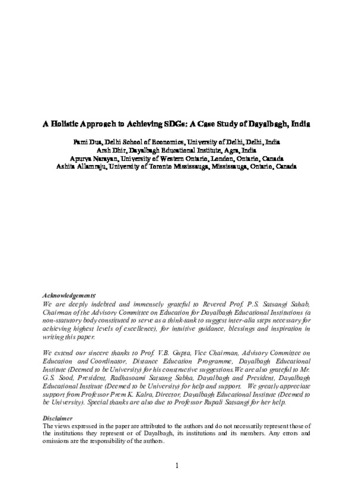| dc.description.abstract | The paper analyses the achievement of SDGs at the global level, national level (India) and
regional levels (Dayalbagh, Agra) using the SDG Index and finds that the progress towards
achieving the SDGs has either slowed, halted or reversed in recent years. The average global
SDG index which was progressing consistently year-on-year from 2000-2019, declined post
the onset of the pandemic. This decline has primarily been due to the reversal in progress
towards SDG1 (No Poverty), SDG2 (No Hunger), SDG3 (Good Health and Well-being), SDG4
(Quality Education) and SDG8 (Decent Work and Economic Growth). At the national level,
India is on track to achieving only two goals (SDG12- Responsible Consumption and
Production and SDG13-Climate Action) while challenges remain in achieving the others
(United Nations, 2022). Thus, ensuring achievement of SDGs requires a fundamental shift in
approach to coping with persistent problems confronting contemporary modern societies. The
paper thus describes the concept of holistic sustainability which addresses another approach -
the inner dimension of sustainability based on people’s values, beliefs, attitudes, spiritual and
intuitive consciousness and conscientiousness. This can provide the basis for a transformation
and is likely to yield a more lasting solution to global challenges and crises. To elaborate on
the role of holistic sustainability, we examine the case of Dayalbagh, a colony located in Agra,
Uttar Pradesh, India as a model for achieving the SDGs. Dayalbagh attains the SDGs through
an ecosystem enriched with values and a ‘Healthcare Habitat’ that is based on the Sigma Six
Quality, Values and Attributes Model. The lifestyle of the residents of Dayalbagh, in harmony
with nature, helps to attain holistic well-being of people and planet, fosters prosperity while
simultaneously attaining holistic sustainability. | en |

